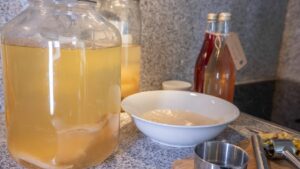 Crafting the perfect brew starts with selecting the finest ingredients. Home brewing enthusiasts understand that the key to a great beer lies in the quality of the components used. From hops to malt and yeast, each ingredient plays a crucial role in shaping the flavor profile of the final product. Exploring the world of home brewing ingredients opens up a realm of possibilities for creating unique and personalized brews. Whether aiming for a hoppy IPA or a rich stout, understanding the characteristics of different ingredients is essential for achieving the desired taste and aroma. With a variety of options available, experimenting with various combinations can lead to discovering new favorite recipes and perfecting the art of brewing at home.
Crafting the perfect brew starts with selecting the finest ingredients. Home brewing enthusiasts understand that the key to a great beer lies in the quality of the components used. From hops to malt and yeast, each ingredient plays a crucial role in shaping the flavor profile of the final product. Exploring the world of home brewing ingredients opens up a realm of possibilities for creating unique and personalized brews. Whether aiming for a hoppy IPA or a rich stout, understanding the characteristics of different ingredients is essential for achieving the desired taste and aroma. With a variety of options available, experimenting with various combinations can lead to discovering new favorite recipes and perfecting the art of brewing at home.
Home Brewing Ingredients
 Brewing beer at home offers enthusiasts the exciting opportunity to experiment with a variety of high-quality ingredients to craft unique and personalized brews. The key components in homebrewing include hops, malt, and yeast, each playing a crucial role in determining the flavor profile of the final product. By carefully selecting these ingredients, individuals can tailor their beer to suit their preferences, whether they prefer a hoppy IPA or a rich, flavorful stout.
Brewing beer at home offers enthusiasts the exciting opportunity to experiment with a variety of high-quality ingredients to craft unique and personalized brews. The key components in homebrewing include hops, malt, and yeast, each playing a crucial role in determining the flavor profile of the final product. By carefully selecting these ingredients, individuals can tailor their beer to suit their preferences, whether they prefer a hoppy IPA or a rich, flavorful stout.
- Hops: As one of the primary ingredients in beer, hops contribute bitterness, aroma, and flavor to the brew. Different hop varieties offer a range of profiles, from citrusy and floral to piney and earthy. By exploring various hop combinations, home brewers can create diverse beer styles that cater to different taste preferences.
- Malt: Malt provides the sugars needed for fermentation and contributes to the beer’s color, body, and sweetness. There are various types of malt, including base malts like Pilsner and specialty malts like caramel and chocolate malts. By blending different malts, brewers can achieve complexity in flavor and color in their beer.
- Yeast: Yeast plays a vital role in the fermentation process, converting sugars into alcohol and carbon dioxide. It also imparts unique flavors and aromas to the beer. There are different strains of yeast, each offering distinct characteristics that can influence the final taste of the brew. Experimenting with various yeast strains allows brewers to achieve different levels of dryness, fruitiness, or spiciness in their beer.
By understanding the significance of each ingredient and experimenting with different combinations, home brewers can unlock a world of possibilities in beer brewing. Whether it’s crafting a crisp pale ale, a robust porter, or a refreshing wheat beer, the choice of ingredients empowers brewers to express their creativity and develop signature recipes that elevate their brewing experience.
Common Types of Grains Used in Home Brewing
Home brewers use a variety of grains to create flavorful beers. Understanding the different types of grains is essential for crafting unique brews. Here are the common types of grains used in home brewing:
Base Malts
 Base malts are the foundation of beer recipes, providing the majority of fermentable sugars. They contribute to the beer’s flavor, color, and body. Some popular base malts include:
Base malts are the foundation of beer recipes, providing the majority of fermentable sugars. They contribute to the beer’s flavor, color, and body. Some popular base malts include:
- Pale Malt: Known for its clean, sweet flavor, ideal for a wide range of beer styles.
- Pilsner Malt: Delivers a crisp, clean taste perfect for lagers and light ales.
- Maris Otter: Adds a rich, malty character, often used in English ales.
From hops to malt and yeast, each ingredient plays a crucial role in shaping the flavor profile of the final product.
Specialty Malts
Specialty malts are used in smaller quantities to add unique flavors, colors, and aromas to the beer. They offer diversity and complexity to the brew. Examples of specialty malts include:
- Crystal Malt: Imparts caramel sweetness and color, commonly found in amber ales.
- Chocolate Malt: Provides roasted, chocolatey notes, enhancing stouts and porters.
- Roasted Barley: Adds coffee-like bitterness and dark color, perfect for dry stouts.
By incorporating a blend of base and specialty malts, home brewers can experiment with different grain profiles to craft distinct and delicious beers, elevating their brewing experience with creativity and flavor diversity.

